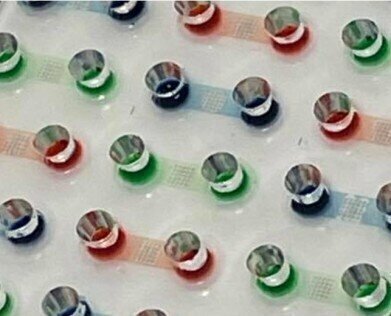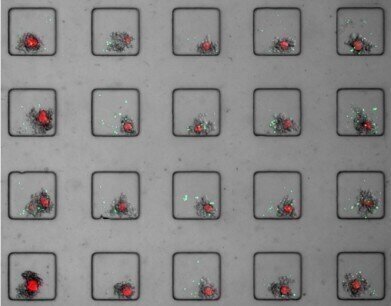-
 The ONCO-Chip3D Single platform (ScreenIn3D Ltd) enables a variety of miniaturised in vitro assays to be performed with physiologically relevant 3D co-culture tumour models.
The ONCO-Chip3D Single platform (ScreenIn3D Ltd) enables a variety of miniaturised in vitro assays to be performed with physiologically relevant 3D co-culture tumour models. -
 数百种3D肿瘤基质共培养物可以被筛选用于联合研究,以评估CAR-T细胞的靶向选择性和杀伤效率。
数百种3D肿瘤基质共培养物可以被筛选用于联合研究,以评估CAR-T细胞的靶向选择性和杀伤效率。
News & Views
Pre-clinical Screening Technology Increases Cancer Test Numbers
Jul 15 2022
A screening tool developed in research led at theUniversity of Strathclydecould increase the number of tests on a solid tumour sample by up to 50 times.
The tool is designed for testing at scale the latest immunotherapies, such as Chimeric Antigen Receptor (CAR) T-cell therapy, which is effective against many haematological cancers but presents challenges when used to treat solid tumours.
Traditional 2D models that are currently used fail to reproduce the complexity of the tumour’s microenvironment, while models based on patients’ tumours are costly and labour-intensive. The Strathclyde-led study has developed a miniaturised platform for screening 3D tumour models to evaluate the toxicity of CAR-T therapy towards cells. The platform enabled visualisation and quantification of how CAR-T cells rapidly targeted, broke up and killed cancer cells without causing significant harm to other cells. In addition, the research found that, while chemotherapy treatment did not act specifically on cancer cells when used alone, cancer cell specificity was enhanced when combined with CAR-T cell treatment.
The study also involved researchers at the University of Glasgow and the Cancer Research UK Beatson Institute in Glasgow. This groundbreaking work has been published in the IEEE Open Journal of Engineering in Medicine and Biology. The research was led by Dr Michele Zagnoni, a Reader in Strathclyde’s Department of Electronic and Electrical Engineering, and recently graduated PhD student Karla Paterson.
扎格诺尼博士说:“评估实体肿瘤有一些特殊的挑战,不仅仅是癌细胞,还有它们周围的细胞。我们正在开发一种技术平台,它可以加速疗法的发展,并提供比目前可用的更能代表身体状况的模型。我们正在为研发实验室提供一种工具,在进行临床试验之前进行测试,这使用更少的资源,可以以合理的成本扩大规模。”他补充说:“CAR-T细胞的发育是昂贵的,而病人提取的组织是有限的资源。我们的目标是在这种条件下进行20到50次以上的实验。”
这项技术将由ScreenIn3D公司商业化,该公司是由Zagnoni博士(首席执行官)和Alex Sim(执行主席)于2018年共同创立的。Karla Paterson和Jolanta Beinarovica是该公司的应用专家。它是在Strathclyde的创新和行业参与团队的支持下成立的。这项研究源于一个更大的项目,该项目最近被斯特拉斯克莱德的斯蒂芬·杨企业家奖评为杰出商业想法研究论文的联合获奖者。该奖项是由查尔斯·黄基金会(Charles Huang Foundation)于2021年向牛津大学捐赠的5000万英镑设立的;杨教授于2021年8月去世,他是黄博士在斯特拉斯克莱德大学学习期间的博士导师和导师。黄博士的礼物价值2000万英镑,是为了纪念杨教授。The research received funding fromAMS Biotechnology Europe Ltd.
For further information please contact Dr Zagnoni at the University of Strathclyde: michele.zagnoni@screenin3d.com
Events
Aug 27 2022Maastricht, Netherlands
Aug 28 2022Lisbon, Portugal
Aug 31 2022Singapore
Sep 06 2022Shanghai, China
Sep 07 2022Chiba, Japan




















